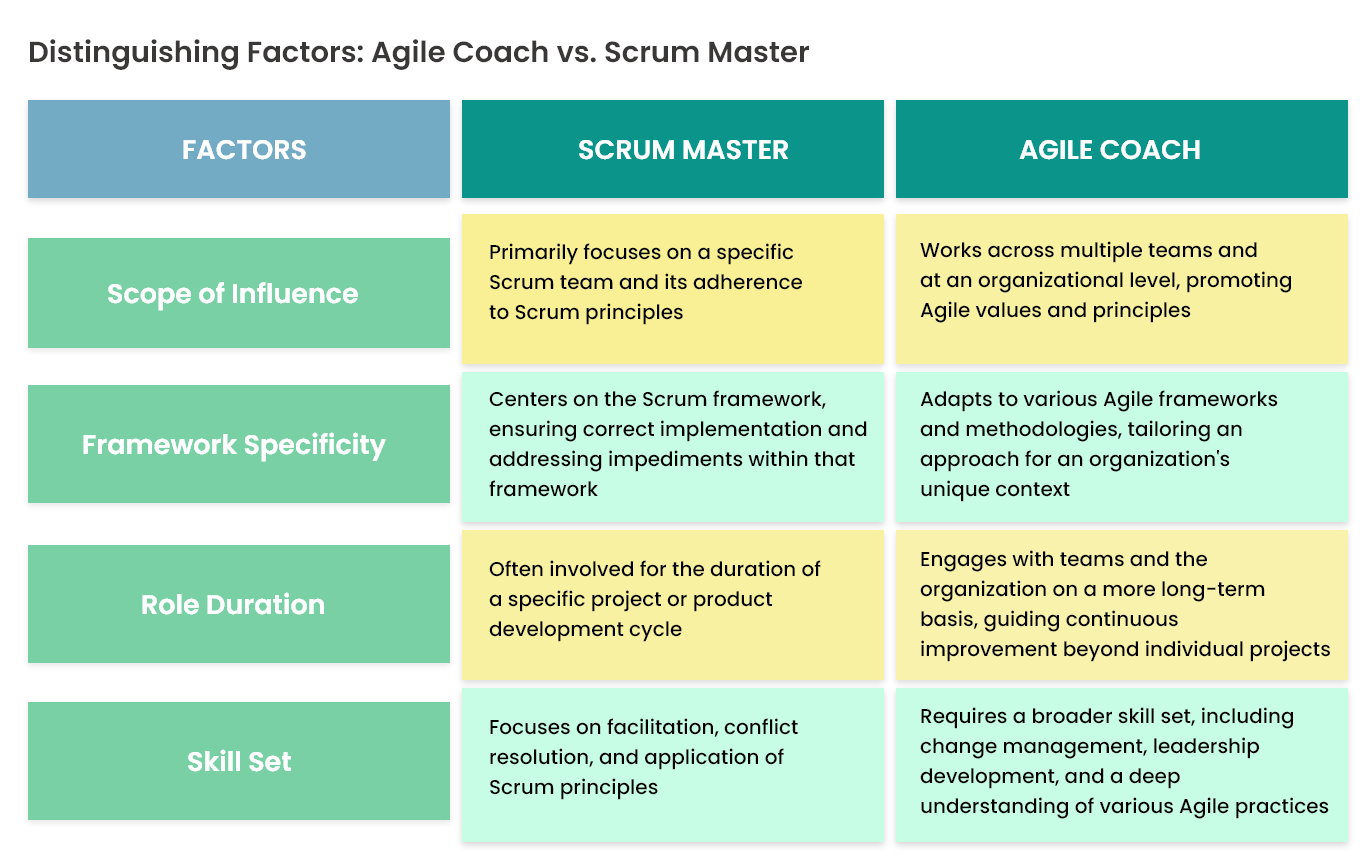Agile Coach Vs. Scrum Master - The Key Differences

In the dynamic landscape of software development, the terms "Agile Coach" and "Scrum Master" are often used interchangeably, leading to a confusion between their distinct roles and contribution within the realm of adaptive software development. While both these roles are integral to the successful implementation of Agile methodologies, they serve different purposes and wield unique skill sets.
Agile Methodology: The Foundation for Adaptive Software Development
Before looking into the role and responsibilities of a Scrum Master and an Agile Coach, it is important to understand the foundation on which these roles operate - Agile methodology. Agile is a set of values, principles and practices that prioritize flexibility, collaboration, and customer satisfaction in software development. It aims to provide a framework for adaptive software development, allowing teams to respond to changing requirements and deliver high-quality products efficiently.
The Scrum Master: Navigating The Scrum Framework
The Scrum framework is a widely adopted Agile methodology, and a Scrum Master plays a pivotal role within this framework. The term "Scrum" has originated from rugby. It emphasizes teamwork and collaboration required to move the ball forward. Likewise, Scrum, in software development, promotes collaboration, iterative progress, and constant communication.
A Scrum Master serves as a facilitator and guardian of the Scrum process. Their focus is to make sure that a Scrum team adheres to the Scrum principles and practices. This involves removing impediments, fostering self-organizing team culture, and promoting continuous improvement. The Scrum Master guides a team towards increased efficiency and effectiveness in delivering valuable software incrementally.
One key aspect of a Scrum Master's responsibilities is to protect the development team from external disruptions and help focus on their work. This involves managing conflicts, fostering a positive team dynamic, and ensuring that the Scrum events (such as Sprint Planning, Daily Sync-ups, Sprint Review, and Sprint Retrospectives) are conducted effectively. In essence, a Scrum Master is focused on the specific framework of Scrum, working diligently to create an environment that helps the team to deliver incremental value to the customer regularly.
The Agile Coach: Nurturing an Agile Mindset
An Agile Coach operates at a broader level, beyond the confines of a specific framework like Scrum. An Agile Coach's responsibility is to foster an Agile mindset throughout the entire organization, guiding teams and leadership towards embracing agility as a cultural shift.
Agile Coaches often work with multiple teams, helping them understand and apply Agile principles. An Agile Coach, unlike a Scrum Master, is never tied to a particular methodology or set of practices. Instead, they draw from various Agile frameworks and techniques to tailor an approach that suits the organization's unique needs. A few examples of such Agile Frameworks are Kanban, Scrum of Scrums, Scaled Agile, Disciplined Agile, Large Scale Scrum and Spotify.
An Agile Coach supports teams to adopt Agile practices, improve collaboration, and embrace change. They facilitate workshops, provide training sessions, and act as mentors to help teams to become self-sufficient in their Agile journey. Beyond teams, Agile Coaches also collaborate with leadership, guiding them to create an organizational culture that aligns with Agile values and principles.

Collaboration in Action: Scrum Master and Agile Coach
While the role of a Scrum Master and an Agile Coach differs, they are not mutually exclusive. In fact, they complement each other to create a robust Agile ecosystem within an organization.
A Scrum Master, with a specific focus on the Scrum framework, addresses immediate concerns within a team. Simultaneously, an Agile Coach works strategically, influencing the organization's overall culture and mindset. Together, they contribute to the larger goal of achieving agility at both, the team as well as organizational levels.
A Symbiotic Relationship for Agile Success
In software development, the roles of Scrum Master and Agile Coach stand as pillars supporting adaptive software development. While the Scrum Master navigates the intricacies of a specific framework, ensuring the team's adherence to its principles, the Agile Coach takes on a broader, more strategic role, shaping the organization's culture and mindset.
In essence, the symbiotic relationship between an Agile Coach and a Scrum Master is crucial for an organization's successful Agile transformation. With the help of distinctive contributions of each role, teams can harness their combined strengths to foster a culture of continuous improvement, collaboration, and, ultimately, deliver value to the customers in an ever-changing landscape of software development.
Thanks for subscribing to our latest blogs, thought leadership and other product updates!
Read our Privacy Notice to know more. You can opt-out of all communications anytime.
